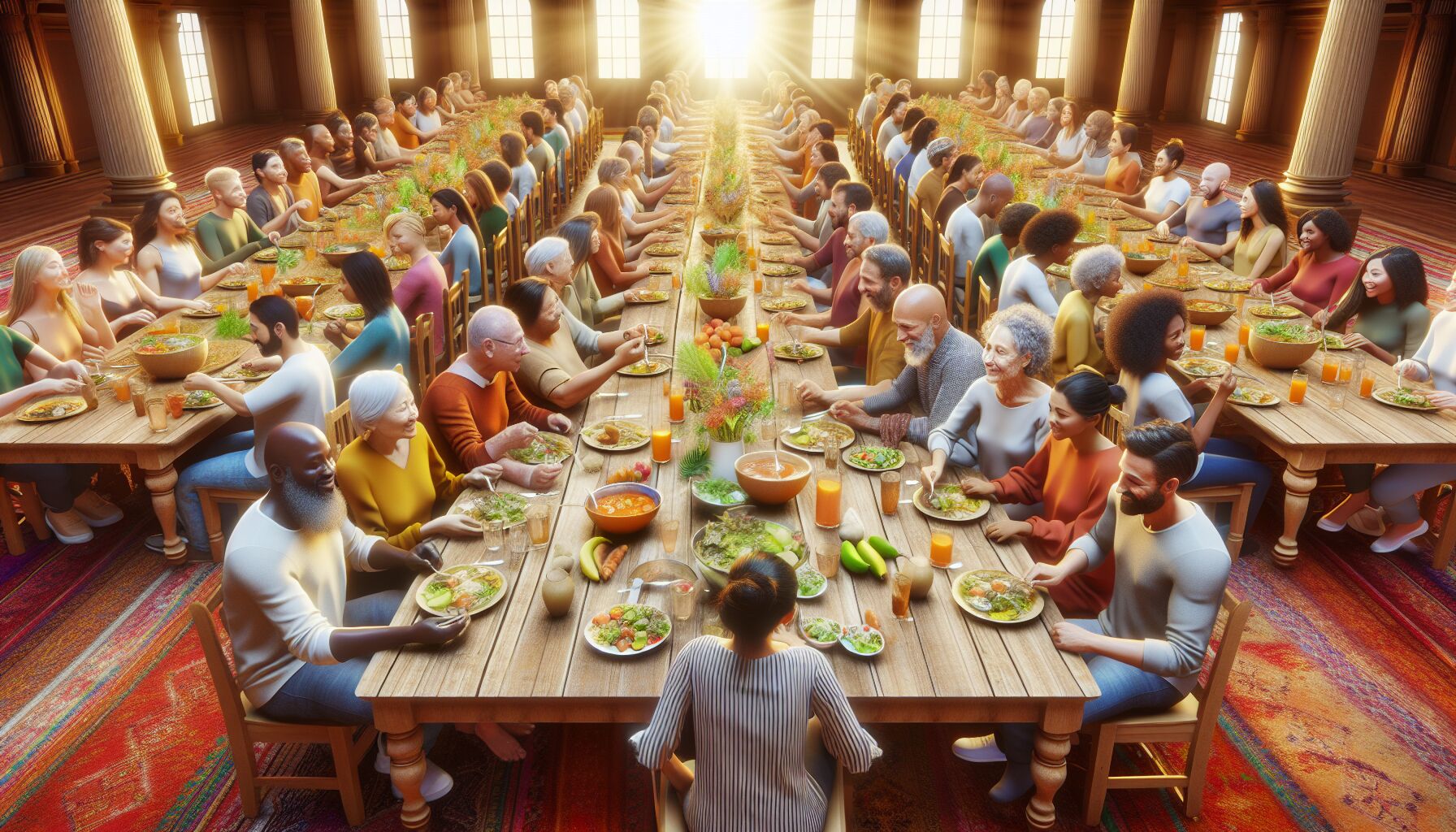 Fasting as a spiritual practice is not just about abstaining from food; it’s an age-old tradition that serves as a bridge to something much greater than ourselves — a divine connection. But what does that actually mean? Let’s unpack it.
Fasting as a spiritual practice is not just about abstaining from food; it’s an age-old tradition that serves as a bridge to something much greater than ourselves — a divine connection. But what does that actually mean? Let’s unpack it.
When we fast, we’re not just cleansing the body; there’s a deeper purification happening. Fasting is like tidying up a cluttered mind, making space to tune into those divine whispers that often get drowned out by daily chaos. It’s as if we’re adjusting the dial on an old radio, fine-tuning our frequency to connect to a higher spirit. It’s no coincidence that various spiritual disciplines, from Christianity to Islam to Buddhism, weave fasting into their tapestries of worship and meditation.
But why does this sacred stillness matter? Fasting is a deliberate pause in our usual rhythm, inviting us to step back from incessant consumption and reconsider what truly nourishes us. It’s about discipline, sure, but not in the punishing sense. It’s more like an intentional practice that brings focus and clarity — something we all need amidst the din of modern life, don’t we?
Mahatma Gandhi once said, “Fasting is the greatest remedy — the physician within.” His words resonate deeply, inviting us to see fasting not just as deprivation but as a source of inner healing and connection. It’s a reminder that what we seek externally, often missing, could be nurtured internally through reverence and quiet reflection.
The ritual of fasting also encourages endurance — not the sort that leaves us weary but the kind that strengthens our will. As the body learns to adapt to fasting, a transformation unfolds within the soul. This discipline sharpens our awareness, making the ordinary moments in life shimmer with extraordinary significance. It’s through this heightened state of awareness that we draw closer to the divine.
Furthermore, hunger itself — that gnawing reminder of our physical needs — becomes a guide. It points us toward the realization that our true sustenance comes from sources beyond the material. In acknowledging our vulnerability, we find strength in spiritual surrender and trust.
Tapping into this divine connection often shakes our routine — sometimes uncomfortably so. However, it’s in these very moments of discomfort that the most profound self-discoveries occur. It’s a journey that each of us can undertake, no invitation required, but one that offers a unique opportunity for reflection, growth, and a deeper understanding of the world around us.
In conclusion, fasting as a spiritual practice propels us toward greater awareness and opens the door to divine insight and understanding. So next time you’re pondering a fast, think beyond the immediate — consider the spiritual wealth that might be awaiting you just beyond that initial hunger.
Cultivating mindfulness
When it comes to nurturing mindfulness through fasting, it’s a bit like fine-tuning an instrument — you become attuned to the subtle notes of your own being. As the fast progresses, what you might initially perceive as hunger morphs into an opportunity for reflection. It’s paradoxical, isn’t it? We abstain from food, yet in doing so, we feed our minds with clarity and intentional presence.
Mindfulness is not just a trend; it’s an ancient practice steeped in the wisdom of being fully present in the moment. Picture yourself as a garden in need of weeding. Fasting acts as the gardener, removing the unnecessary distractions that muddy our mental soil. This newly acquired focus is akin to turning off a noisy fan in a quiet room, letting you notice the subtle hum of life that usually goes unheard.
Fasting creates a sacred space for this gentle awareness. Think about it: a day without the routine chatter of meals is a day where each moment receives undivided attention. Instead of the usual autopilot, there’s a conscientious presence in everything we do. Have you ever experienced a sunset during a fast? The colors blaze with a vibrancy that speaks to your soul, reminding you that beauty isn’t just seen — it’s felt deeply.
Mindfulness achieved through fasting also catalyzes inner strength. It’s reminiscent of an athlete training their body, but here, the mind is the primary focus. It’s discipline in its most liberating form. By consciously choosing to forgo comforts, you strengthen your willpower, much like how a craftsman hones his tools. And in this honing, there’s transformation—a clarity of thought and a purity of intention that were perhaps obscured before.
A remarkable thing about fasting is how it rewires our relationship with time. Hours once defined by meal schedules become open landscapes, inviting curiosity and reflection. The mind, unburdened by its usual preoccupations, drifts naturally to contemplation. What else could provide such a profound reprieve from the rush of the everyday?
But let’s not forget the ripple effect. This mindfulness isn’t confined to your inner self. It spills into your interactions with others and the environment. When you’re truly present, conversations hold more weight. Silence becomes comforting rather than awkward, and even mundane tasks feel infused with meaning. This is where the real magic happens—simple awareness blossoming into profound understanding.
In stepping away from the cycle of consumption, you’re initiating a powerful shift. You create personal time that isn’t governed by external demands but by a quest for authentic presence. The benefits of this practice extend beyond the duration of the fast, echoing in everyday choices, actions, and collaborations with others.
So, as you consider integrating fasting as a mindful practice, embrace the discomfort, the silence, and the heightened senses. Who knows what whispers of wisdom you might uncover amidst the quiet?
Strengthening community bonds
 Fasting has a unique way of strengthening the fabric of our communities. This communal aspect of fasting often goes unnoticed, but it’s a beautiful dance of shared purpose and mutual support. Ever observed how food — or the lack of it — can bring people together? When a group chooses to fast, it transcends the physical realm, nurtures a shared ethos, and fosters a deeper connection. There’s something mighty profound about knowing that you’re not alone in your journey, that others walk with you, sharing the same hunger, same reflections.
Fasting has a unique way of strengthening the fabric of our communities. This communal aspect of fasting often goes unnoticed, but it’s a beautiful dance of shared purpose and mutual support. Ever observed how food — or the lack of it — can bring people together? When a group chooses to fast, it transcends the physical realm, nurtures a shared ethos, and fosters a deeper connection. There’s something mighty profound about knowing that you’re not alone in your journey, that others walk with you, sharing the same hunger, same reflections.
Think about communal fasts during Ramadan or Lent, for instance. There’s an unspoken bond, a silent nod, recognizing the shared discipline of abstaining from food and the collective focus on spiritual growth. It’s a reminder that while we may find ourselves on personal quests, the shared experience enhances our understanding and compassion. That’s where the magic lies — in the shared silence, the collective endurance, the united goal of seeking a divine connection that’s larger than any single person.
J.R.R. Tolkien noted, “A single dream is more powerful than a thousand realities.” When fasting becomes a communal dream, it crafts a tapestry of empathy and understanding more vivid than any isolated experience. Isn’t it heartwarming to know that such shared acts can ignite community spirit, encouraging richer interactions and heartening conversations?
Now, let’s string together how this communal act translates to tangible bonds — potluck meals to break the fast, where each dish becomes a symbol of love and care. The potluck isn’t just about eating; it’s a celebration of unity. It’s an occasion where flavors aren’t the only things exchanged — stories, laughter, and an ever-growing sense of community are also on the menu.
On another note, there lies a practical dimension to communal fasting in today’s digital age. There are global online platforms where people connect, share insights, and support one another virtually, creating a tapestry of digital togetherness. Isn’t that a curious blend of tradition and technology?
As communal fasting extends beyond religious observances, it finds avenues in wellness retreats and causes, like fasting for climate awareness or social justice. These initiatives remind us that fasting isn’t only about individual purification but also about catalyzing collective action and awareness.
Here’s a thought: Could the hunger we share be the glue that mends the divides between us? In every community seeking balance and unity, fasting offers a chance to recalibrate, reconnect, and rediscover that underlying spirit of interdependence. As the great Maya Angelou expressed, “We are more alike, my friends, than we are unalike.” It’s in this shared hunger, both spiritual and physical, that we find the courage to strengthen the ties of kinship and empathy.
So next time you ponder over fasting, consider not just the personal growth but the community bonds it fortifies. Maybe, just maybe, the world can be a smaller, friendlier place — one shared fast at a time.
 DS Haven In Light Of Things
DS Haven In Light Of Things






